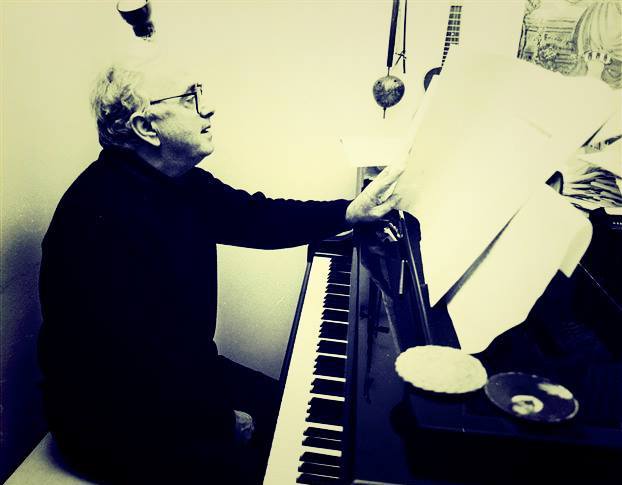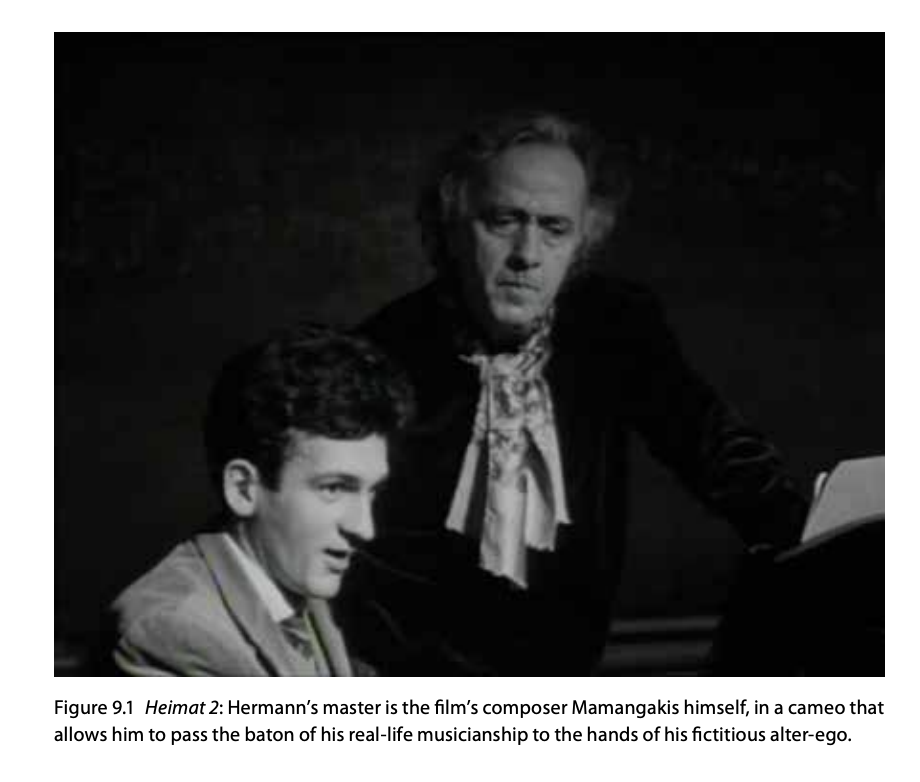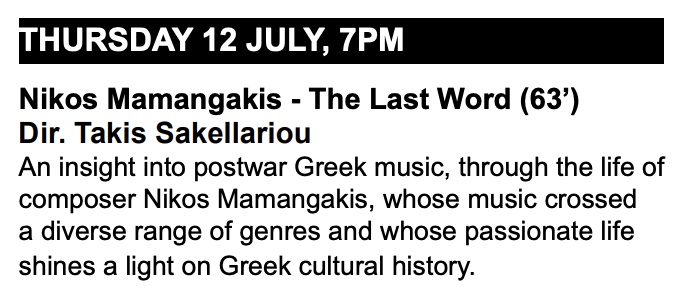
How I found Nikos
Nikos Mamangakis was a Greek composer, born in Crete.
He first came to my attention when I found out he wrote most of the music to Die Zweite Heimat, arguably the best piece of television ever made.
I could not really extricate the music of Mamangakis fromDie Zweite Heimat. Both were like being in the analyst’s chair. A deeply emotional journey, at times abstract, but, ultimately, one made from a first class train carriage, with velvet seats.
I first saw Die Zweite Heimat at the impressionable age of 18 in the spring and summer of 1993, I think. I was lodging with a lady who was ten years my senior and her fiancee. The fiancee, whenever he walked through the living room, would smile at the fact that I was watching ‘foreign films’ again and give me a knowing wink. There was a bit of that in Die Zweite Heimat, and I didn’t mind that there was (knowing wink back), but there wasn’t alot.
I loved Die Zweite Heimat because it explored psychoanalytic themes, but in a way that was played out in the everyday lives of university students. It fitted well with where I was, for lots of reasons.
The music, which I’d never thought about, fitted perfectly. It was classical, but nu-wave classical, abstract and always very interesting. I’d never heard anything like it before.
It helped make the series. Undoubtedly. And many years later, to my surprise, I had found that it had been written by a Greek. I had always assumed, without really thinking about it, that it had been written by a German, principally because the series was set in Germany, was about German musicians and was written and directed by a German.

Discovering the back catalogue
A few years back, with the internet to inform me, Amazon to supply me and a few pounds in a back pocket that had for most of my life been pretty empty, I decided to splurge out on several Mamangakis albums. I noted that most of them were presented in his native Greek language, it seems there hasn’t been a great appetite for Mamangakis in the English speaking world. It also appears that his album are, if not exactly rare, not common, and so a little bit pricey. One has to take a breath before pressing buy.
Without doubt, the album that I first took too, and which was a pure delight, was his album named ‘Erotokritos’.
When I bought it and listened to it, over four or five years ago, I was immediately delighted with it. It had the same brilliance as the music score for Die Zweite Heimat, but it was oh so different too.
Without understanding a word of it I immediately fell in love with what was going on, as soon as the music started. It had a beautifully old gentle folk feel to it, a Greek feel, if you can imagine that. The stunning element though was the two singers, a woman with the most beautiful of voices, and a man with a deep resonant voice. Both voices spoke from the heart, and somehow the tone and timbre of the voices seemed to tell tales of desire, belonging and sexual longing. I found the whole thing incredibly erotic, but not in the way my landlady’s fiancee might think about it. Not a cheeky slap of the arse, but rather earnest desperate longing. When the two voices mixed it sounded like sex, but loving sex, not just a fuck.
I loved too that stylistically it involved elements of talking, elements of singing, elements of harmonising. Sometimes there was just instrumental arrangements. When there was talking there were musical sounds behind to add emphasis. It was just a very interesting composition.
I have, in the process of writing this page, found that Erotokritos is a Greek play. I imagine Mamangakis must have taken this traditional Greek play and put it to music, used his own particular style to interpret it. I am generally speaking, less interested though, in what Mamangakis was doing with this piece, where it came from and what he did to it; rather than how it has made me feel in listening to it over the years to come.
I definitely feel that it transported me to some imagined Greek pure and natural state of longing and lust. I felt liberated by the honesty of the emotions and things said by the singers, and couldn’t help but imagine that with all the longing and lusting, that they ended up consummating their love, and that some of their songs were indeed a celebration of that. It is the ultimate paen to feeling like one is in love, and being in the perfect space of happiness and human fulfilment, and that it could only happen in Greece, to simple, uncomplicated, naturalistic Greek men and women who had no other ability than to feel and realise love. The story, the real story, may be quite different though.
It is a curious thing. I’ve only seen black and white photos of Mamangakis, he doesn’t look much of an Eros, and yet he seems to have an interest in it all, and be able to bring out in others.
There’s a whole book on the play here.
Here’s something to digest: http://www.musicale.gr/synthetes/mamagakis_cv_en.html
How could a Greek, I thought, be able to produce a musical backsound, so fitting for what was something so German?
I still don’t know the answer to that, but once I had found out the role that Nikos Mamangakis had played in Heimat I was determined to find out more. Not without trepidation I might add, I was kind of hoping I would find that he had produced a treasure trove of Heimat like sounds, and yet knew that I was likely to be disappointed. There was only one Die Zweite Heimat and only one set of accompanying sounds.
What I did find was an impressive back catalogue of what seems to be Greek folk music pieces.
There’s not a lot written about Mamangakis in English. Its hard to really understand what he was about and what his music was about. I am assuming that his music is a contemporary take on Greek folk music traditions but I can’t be sure.
Of course, my sense of wonder, my question about how someone so Greek could produce something so German, had to have an answer didn’t it!
There are clues. Here and there. On the cover notes to one his albums, written by a G Papaioannou, it points out that Mamangakis started off life at the Greek Conservatory of Athens. He then moved on to study ‘musical composition’ with Carl Off and H.Gedamer in Munich and electronic music at the SIEMENS Electronic Music Studio with Joseph Anton Ridle. So at a relatively early point in his life Mamangakis went German. Not only that but he went Munich. Die Zweite Heimat was set in Munich. It would not be a suprise to think that Mamangakis went on to meet the Director of Die Zweite Heimat, Edgar Reitz, in Munich, and later on the two collaborated together in the music for the series.
Its well worth folloing up Carl Off, H Gedamer and Joseph Anton Ridle, to see what they were up to.
The album notes state that he received scholarships from the Greek government, the Supreme Music Academy of Munich and the city of Berlin (Deutscher Akadamischer Austauscudienst). So Mamangakis, then, was funded by the German state, he was incorporated into the modern post-Nazi German project.
The album notes sta that he went on to write
- Music for 4 protagonists, 1959-60
- Constructions, 1960
- Combinations, 1961
- Lingual symbols, 1961-2
- Cassandra, 1963
- Cycle of numbers
- Monologue, 1962
- Competitions, 1963
- Tritus, 1966
- Tetractus, 1963-6
- Acroama, 1967
- Scenario for 2 improvisonal art critics, 1968
- Performance, 1969
- Exercise, 1969-70
- Summary, 1970
- Erofili, 1970
- Kikeonas, in 1972, for the Munich Olympics
- Mourning, 1978
- Encomium for Nikos Skalkota, 1978
- The ‘anarchy’ concerts, for the Donaushiegen Festival
- The Centre of Passers-By
- 11 Folk Songs
- Two operas
- Erotokritos
- Odyssey
https://www.youtube.com/user/mamangakis/playlists
https://mamangakis.weebly.com/deltaiotasigmakappaomicrongammarhoalphaphi943alpha.html
Erotokritos was perforamed at the National Theatre of Orleans in 1st May 2005
Apparently he also wrote music for almost all of Nikos Perrakis’ film scores.
And his music for Edgar Reitz Heimat series, which was premiered in Munich Opera in 1992.
Mammangakis, was said by Gunther Becker, to stand alongside Xenakis, Skalkotas and Christou.
Apparently, just before his death there was a documentary or an interview done with Mamangakis.
Nikos Mamangakis, the last word. Dir. by Takis Sakellariou. Greece, 2018. 63’
I’ve no idea how I might get hold of that to watch it – if you know let me know.
It seems to be bought out for various Greek music film festivals around the world – but not widely available and not on sale.

Here’s the full thing but in Greek
Anyone got it with English subtitles?
I should search music using his Greek name and spelling: ΝΙΚΟΣ ΜΑΜΑΓΚΑΚΗΣ
I might find some gems that have not been shared in English.